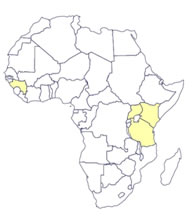Pro-poor Rewards for Environmental Services in Africa (PRESA)
Various schemes, proposals and pilots
Summary
PRESA is a platform to generate and share knowledge to build capacity on Payments for Environmental Services (PES). Its main purpose is to build a community of practice across Africa to share lessons, tools and experience, advice and training. It currently works at seven sites across East and West Africa, only one of which has been piloted so far (Uluguru Mountains in Tanzania).

PRESA watershed services projects
Country |
Name |
Status |
Comment |
Guinea |
Fouta Djallon Highlands |
Proposal |
Working in partnership with the Conakry University, prototypes of PES are being developed for water (with a water company) and biodiversity (selling offsets to mining companies to protect chimpanzee habitat). |
Kenya |
Green Water Credits in
Mount Kenya East / upper Tana River |
Advanced proposal |
Working with International Soil Reference and Information Centre (ISRIC) and local organisations, it focuses on management of rain-fed agricultural lands to control losses through evaporation (green water/blue water approach). Detailed biophysical studies, as well as socio-economic and institutional analysis have been done, and political support is slowly being carved. |
|
Lake Victoria; |
Proposal |
Working on the Nyando river basin on soil erosion and nutrient runoff. Because of high levels of poverty in the area a local consortium is designing publicly funded payments. |
|
Sasumua |
Proposal |
Sasumua dam is located at the southern ridges of Kenya’s Aberdare Mountains, and provides water to the city of Nairobi. The project proposes to use land-based activities (i.e. grassed waterway) to reduce sediment load. Part of the Equitable Payments for Watershed Services project (World Wildlife Fund [WWF]/ Cooperative for Assistance and Relief Everywhere [CARE]) |
Uganda |
Albertine Rift |
Proposal |
Payments or rewards for environmental services have been piloted in this region, mainly focusing on carbon (Plan Vivo). PRESA joins to supplement and focus on water degradation issues. Partners include Ecotrust Uganda and Nature Harness Initiatives (NAHI). Different incentive options for watershed management are considered. |
Tanzania |
Uluguru Mountains |
Pilot |
Part of the Equitable Payments for Watershed Services project (WWF/CARE). Contracts were developed with 200 households for planting 20,000 tree seedlings, in exchange for US$0.20 per year for each surviving seedling. The project focuses on the catchment of the Ruvu river- the source of 90 per cent of the water used by domestic and industrial users in Dar es Salaam, and where rapid expansion of farming to the steep slopes of the catchment has increased the silt load in the river and raised water treatment costs, especially in the last five years. Following feasibility studies (livelihoods and hydrology baseline assessments, policy and legal framework review and cost benefit analysis to show buyers how much more expensive it would be to arrange alternative water supply), the project identified justifiable business criteria and secured support from one of the main water users (Coca Cola), served by the city’s water utility Dar es Salaam Water and Sewerage Corporation (DAWASCO) (Dosteus, in Food and Agriculture Organization (FAO)-CARE 2009). |
|
Usambaras |
Proposal |
The project proposes to tacke deforestation and unsustainable land use practices at the Usambara Mountains. Partners include International Centre for Research in Agroforestry (ICRAF) and Selian Agricultural Research Institute (SARI). Potential buyers include irrigation schemes, hydro-electric power producers, carbon sales, and conservation organizations. |
Links
http://presa.worldagroforestry.org/where-we-work/
|
 |
back to top
back to top
back to top
|


